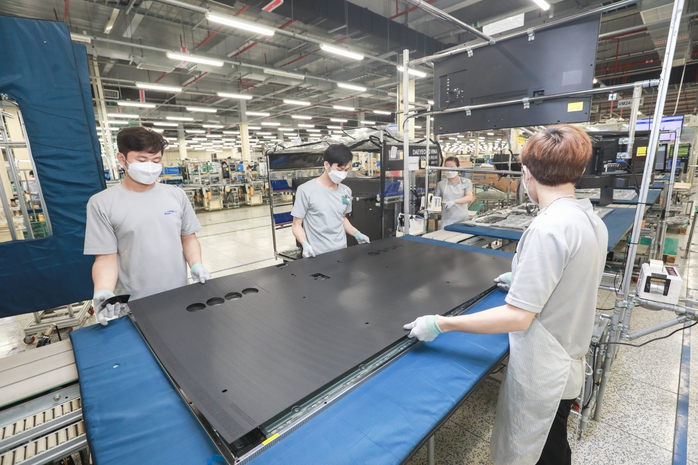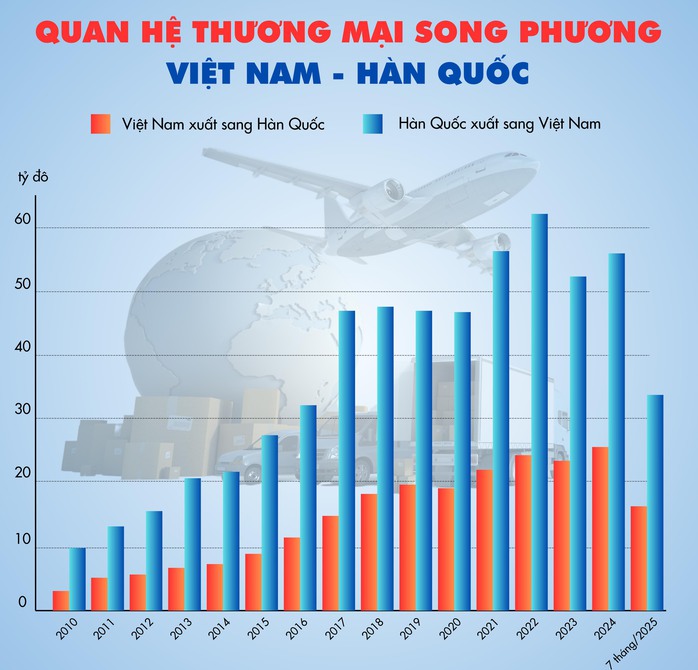Not only Samsung, but a series of major Korean conglomerates such as LG, Hyosung, Lotte, and SK are continuously expanding their investments in Vietnam.
Vietnam–Korea cooperation holds many positive prospects and great potential, especially in the fields of trade and investment.
The Largest Investor
According to statistics from the General Statistics Office (Ministry of Finance), in terms of FDI (foreign direct investment) inflows into Vietnam as of 2024, Korea is the largest foreign investor in Vietnam with 9,534 projects and a total accumulated investment capital of nearly USD 85.87 billion, accounting for nearly 18.3% of Vietnam’s total FDI. From 1988 to date, the total number of new projects from Korea in Vietnam has reached 10,152, with a total registered accumulated investment capital of up to USD 92 billion.
Korea’s main investment sectors include manufacturing and processing industries, high technology, electronics, automobiles and auto parts, construction, and real estate. Additionally, finance and securities have also attracted many Korean enterprises such as Mirae Asset and KIS. Some localities in Vietnam, such as Bac Giang, are drawing strong Korean FDI, especially in the semiconductor and electronics industries.
The year 2025 marks the 30th anniversary of Samsung’s investment in Vietnam. To date, the conglomerate has invested over USD 23.2 billion in a series of projects in Ho Chi Minh City, Bac Ninh, and Thai Nguyen. Beyond manufacturing, Samsung has also contributed to putting Vietnam on the global research and development (R&D) map with its USD 220 million R&D Center in the Tay Ho Tay urban area (Hanoi), gradually completing its strategic investment picture in Vietnam.
Alongside Samsung, many other major Korean conglomerates such as LG, Hyosung, Lotte, and SK are also continuously expanding their presence in Vietnam.
Currently, Vietnam is actively attracting Korean enterprises to invest in potential sectors, including energy such as gas-fired power, LNG terminals, nuclear power – small modular reactors (SMRs), and more. According to Mr. Hong Sun, Honorary Chairman of the Korean Chamber of Commerce and Industry in Vietnam (KoCham), Vietnam’s energy market is recognized as an attractive investment destination for Korean investors due to its high growth potential.
Many Prospects
According to the Foreign Market Development Department (Ministry of Industry and Trade), in 2024, Vietnam–Korea bilateral trade reached USD 81.5 billion, up 7.3% compared to 2023.
In the first seven months of 2025, bilateral trade between the two countries reached USD 49.9 billion, up more than 7.5% year-on-year. Of this, Vietnam exported USD 16.3 billion to Korea and imported USD 33.6 billion from Korea.
In recent years, Vietnam–Korea trade has benefited greatly from bilateral and multilateral free trade agreements (FTAs) in which both sides participate, especially the Vietnam–Korea Free Trade Agreement (VKFTA).
Mr. Hoang Danh Huu, Director of Ede Farm Trading and Service Co., Ltd. (Miss Ede brand, Dak Lak Province), said that Miss Ede spent four years preparing for its first shipment of processed coffee to the Korean market in May 2025. “Our goal at Miss Ede is that once we enter the Korean market and win over young Korean consumers, it will be a gateway to understanding the consumption habits of young people globally,” Mr. Huu said.
According to Mr. Hong Sun, the prospects and potential for Vietnam–Korea cooperation in investment and trade remain substantial. Vietnam’s abundant and competitive labor force is favorable for investment in energy-related manufacturing industries. Moreover, Vietnam has deep economic cooperation with Korea, which could positively impact the success of market penetration and business expansion by Korean investors.
The Vietnam Trade Office in Korea stated that the two countries are aiming to achieve USD 150 billion in bilateral trade by 2030, further promoting cooperation in trade, industry, and energy in the coming years.
To achieve this goal, the Vietnam Trade Office in Korea will continue to support Vietnamese enterprises, especially small and medium-sized ones, in exporting potential goods to Korea such as textiles, footwear, wooden products, agricultural and aquatic products, and processed foods. This will require boosting trade promotion, opening the market for agricultural products, providing training on import standards, enhancing design and e-commerce capabilities, and connecting businesses with direct distribution channels.
A Commitment to Partnership
According to Deputy Prime Minister and Minister of Foreign Affairs Bui Thanh Son, economic, trade, and investment cooperation has always been one of the most important pillars in bilateral relations, serving as a driving force for the overall development of both Vietnam and Korea. In a global context marked by uncertainties such as geopolitical tensions, rising trade protectionism, and especially tariff risks from some major partners, more than ever, the two countries need to coordinate to ensure the sustainability and flexibility of supply chains, given the high complementarity of their economies.
On that basis, Vietnam is committed to accompanying Korean enterprises in developing diversified and high-value supply chains, while encouraging Vietnamese enterprises to participate more deeply and at higher segments in the global supply networks of Korean companies. The Party and State of Vietnam are ready to create the most favorable conditions for foreign investors, including those from Korea, to continue stable and long-term investment, as well as to seek new investment opportunities for mutual development.
A Leading Partner of Ho Chi Minh City
Korea is currently one of Ho Chi Minh City’s leading partners in trade, investment, and tourism, with a community of more than 80,000 people and over 2,000 Korean businesses living and operating in the city. This is an important resource contributing to the city’s development and acting as a bridge to strengthen ties between the two countries.
In terms of investment, as of the end of January 2025, Korea was the third-largest investor in Ho Chi Minh City with 2,286 projects and total capital of USD 5.5 billion.
In the context of the city implementing multiple measures to support businesses, attract investment, and restore economic growth, Ho Chi Minh City’s authorities are making maximum efforts to ensure a stable socio-political environment and create all favorable conditions for foreign enterprises, especially Korean businesses, to operate long-term and effectively.













